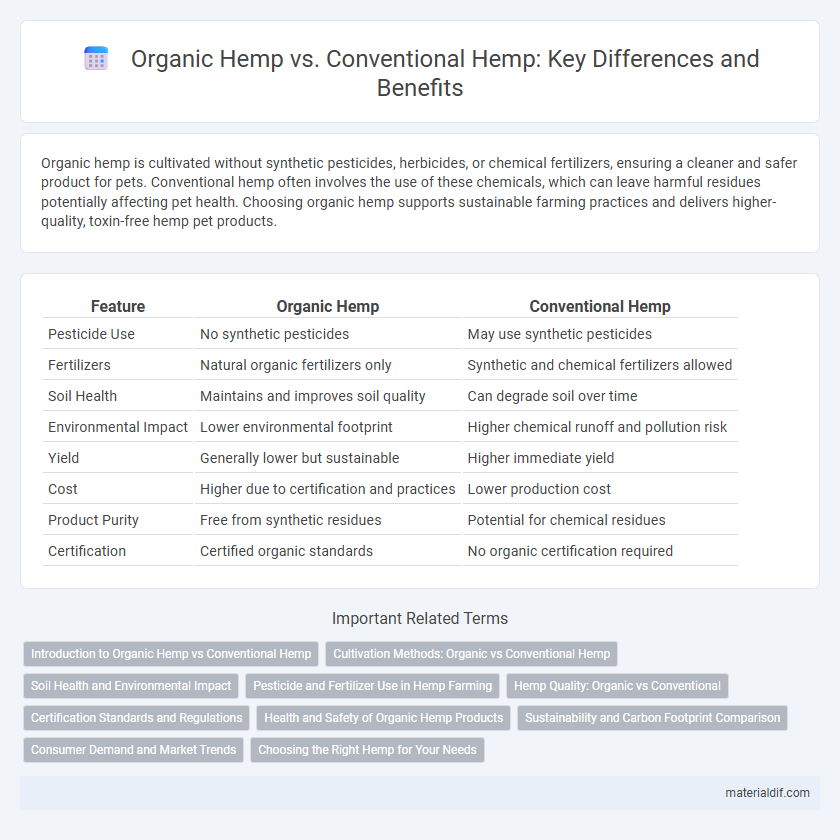Organic hemp is cultivated without synthetic pesticides, herbicides, or chemical fertilizers, ensuring a cleaner and safer product for pets. Conventional hemp often involves the use of these chemicals, which can leave harmful residues potentially affecting pet health. Choosing organic hemp supports sustainable farming practices and delivers higher-quality, toxin-free hemp pet products.
Table of Comparison
| Feature | Organic Hemp | Conventional Hemp |
|---|---|---|
| Pesticide Use | No synthetic pesticides | May use synthetic pesticides |
| Fertilizers | Natural organic fertilizers only | Synthetic and chemical fertilizers allowed |
| Soil Health | Maintains and improves soil quality | Can degrade soil over time |
| Environmental Impact | Lower environmental footprint | Higher chemical runoff and pollution risk |
| Yield | Generally lower but sustainable | Higher immediate yield |
| Cost | Higher due to certification and practices | Lower production cost |
| Product Purity | Free from synthetic residues | Potential for chemical residues |
| Certification | Certified organic standards | No organic certification required |
Introduction to Organic Hemp vs Conventional Hemp
Organic hemp is cultivated without synthetic pesticides, herbicides, or chemical fertilizers, promoting environmental sustainability and soil health. Conventional hemp often relies on chemical inputs to maximize yields but may carry residues that impact product purity and ecological balance. Choosing organic hemp supports cleaner production methods and aligns with consumer preferences for natural and eco-friendly products.
Cultivation Methods: Organic vs Conventional Hemp
Organic hemp cultivation relies on natural fertilizers, crop rotation, and biological pest control to maintain soil health and reduce chemical residues, promoting sustainable farming practices. Conventional hemp farming often uses synthetic pesticides, herbicides, and chemical fertilizers to maximize yield and control pests, which may impact soil quality and introduce chemical residues. The contrasting cultivation methods influence the environmental footprint, product purity, and suitability for applications in health and wellness industries.
Soil Health and Environmental Impact
Organic hemp cultivation enhances soil health by utilizing natural fertilizers and crop rotation, which improves microbial activity and reduces soil erosion. Conventional hemp farming often relies on synthetic pesticides and fertilizers, which can degrade soil quality and contaminate water sources. The environmental impact of organic hemp is significantly lower, promoting biodiversity and minimizing chemical runoff compared to conventional methods.
Pesticide and Fertilizer Use in Hemp Farming
Organic hemp farming strictly prohibits synthetic pesticides and fertilizers, relying instead on natural methods such as crop rotation and organic compost to enhance soil fertility and pest resistance. Conventional hemp farming often uses chemical pesticides and synthetic fertilizers to boost growth and control pests, which can lead to residue buildup and environmental concerns. Studies show organic hemp typically contains fewer pesticide residues, making it a safer choice for consumers seeking cleaner, chemical-free products.
Hemp Quality: Organic vs Conventional
Organic hemp is cultivated without synthetic pesticides or herbicides, resulting in a purer, chemical-free product that is often richer in cannabinoids and terpenes. Conventional hemp, grown with synthetic inputs, may contain trace residues that can affect overall quality and consumer safety. Studies indicate organic hemp tends to have higher soil health and nutrient content, contributing to superior fiber strength and cannabinoid potency.
Certification Standards and Regulations
Organic hemp cultivation adheres to strict certification standards such as USDA Organic, which prohibits synthetic pesticides, herbicides, and genetically modified organisms, ensuring environmentally sustainable practices. Conventional hemp production, while regulated under the 2018 Farm Bill, allows the use of synthetic chemicals and lacks comprehensive organic certification, potentially impacting product purity and soil health. Regulatory frameworks for organic hemp require rigorous soil testing and crop rotation, enhancing soil fertility and reducing contamination risks compared to conventional methods.
Health and Safety of Organic Hemp Products
Organic hemp products are cultivated without synthetic pesticides or herbicides, significantly reducing the risk of harmful chemical residues that can affect consumer health. Studies show organic hemp contains fewer heavy metals and contaminants compared to conventional hemp, enhancing product safety. Consumers seeking natural, toxin-free hemp benefits prefer organic options for their higher purity and lower exposure to potentially hazardous substances.
Sustainability and Carbon Footprint Comparison
Organic hemp cultivation significantly reduces carbon footprint by avoiding synthetic pesticides and fertilizers, promoting healthier soil and biodiversity. Conventional hemp farming often relies on chemical inputs that increase greenhouse gas emissions and soil degradation, negatively impacting long-term sustainability. Sustainable organic practices enhance carbon sequestration, making organic hemp a more eco-friendly choice compared to conventional methods.
Consumer Demand and Market Trends
Consumer demand for organic hemp is surging due to preferences for chemical-free and environmentally sustainable products. Market trends indicate a significant shift as organic hemp fetches higher prices and drives new product development in wellness and textiles. Conventional hemp remains prevalent but faces growing scrutiny over pesticide use and environmental impact, influencing buyer choices.
Choosing the Right Hemp for Your Needs
Organic hemp cultivation uses natural farming practices that avoid synthetic pesticides and fertilizers, promoting healthier soil and reducing environmental impact. Conventional hemp often relies on chemical inputs for higher yields but may carry residues and environmental risks. Selecting the right hemp depends on your priorities for sustainability, product purity, and intended use, with organic hemp favored for wellness products and eco-conscious consumers.
Organic hemp vs Conventional hemp Infographic

 materialdif.com
materialdif.com